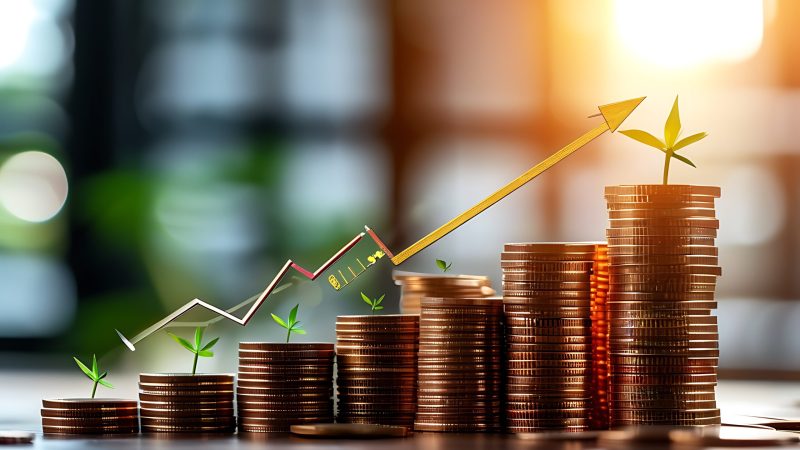

The Power of Compound Interest for Financial Freedom
If you’ve ever wondered why some people seem to accumulate wealth effortlessly while others struggle to make ends meet, the answer often lies in one powerful concept: compound interest. While it may sound like a dry financial term, compound interest is, in reality, a magical force that can transform small, consistent investments into substantial wealth over time. Understanding how to harness the power of compound interest is key to achieving financial freedom.
Let’s get to know what compound interest is, how it works, strategies to maximize it, and how you can use it to grow your wealth.

What is Compound Interest?
At its core, compound interest is the interest earned on both the original principal amount and the interest that has already been accumulated. It’s essentially “interest on interest.” The process snowballs your money over time, allowing even small investments to grow exponentially.
Imagine planting a tree. At first, it grows slowly, but with the right care and time, it flourishes into something much larger than you initially thought possible. Compound interest works the same way.
There are two types of interest:
- Simple Interest: This is calculated on the principal amount only. For example, if you invest ₹1000 at 5% simple interest, you earn ₹50 every year, no matter how long you keep the money invested.
- Compound Interest: This is calculated on the principal plus any previously earned interest. Using the same example of ₹1000 at 5%, the first year you earn ₹50, but the next year, you earn interest on ₹1050, and so on.
The compounding effect makes a massive difference over time. The longer your money remains invested, the more dramatic the growth.
How Compound Interest Works
To understand the full potential of compound interest, let’s break down its process using an example.
Imagine you invest ₹1,000 at an annual interest rate of 5%, compounded annually. After one year, you will have:
- Principal: ₹1,000
- Interest (5%): ₹50
- Total at the end of Year 1: ₹1,050
In the second year, the interest is calculated on ₹1,050, not just the original ₹1,000.
Here’s how it looks at the end of Year 2:
- Principal: ₹1,050
- Interest (5%): ₹52.50
- Total at the end of Year 2: ₹1,102.50
By the third year, your investment keeps growing, and the interest keeps compounding. While ₹50 doesn’t seem like much initially, over several years (or decades), the growth becomes exponential.
Year |
Principal |
Interest Earned |
Total Value |
|---|---|---|---|
|
1 |
₹1,000 |
₹50 |
₹1,050 |
|
2 |
₹1,050 |
₹52.50 |
₹1,102.50 |
|
3 |
₹1,102.50 |
₹55.13 |
₹1,157.63 |
|
10 |
₹1,628.89 |
₹81.44 |
₹1,710.33 |
|
20 |
₹2,653.30 |
₹132.67 |
₹2,785.98 |
|
30 |
₹4,321.94 |
₹216.10 |
₹4,538.04 |
After 30 years, a ₹1,000 investment has grown to over ₹4,500 simply by compounding at a steady rate of 5% annually. The key takeaway here is that time is your best friend when it comes to compound interest. The longer you invest, the more wealth you accumulate.

Why Compound Interest is Essential for Financial Freedom
Financial freedom means having enough money to live comfortably without worrying about where your next paycheck will come from. One of the most reliable ways to achieve this is through investments that harness the power of compound interest.
You Don’t Need a Huge Initial Investment
Contrary to popular belief, you don’t need a massive amount of money to start investing. Even small, consistent contributions can grow significantly over time. Starting early is far more important than the amount you initially invest.
It Rewards Patience
The beauty of compound interest lies in its exponential growth. It takes time, but if you’re patient and let your investments grow, compound interest will reward you handsomely.
It’s a Passive Wealth Generator
Once your money is invested and compounding, it grows passively. You don’t need to constantly monitor or manage it. This passive wealth creation is one of the most powerful ways to build financial security.
Strategies to Maximize Compound Interest
Start Early
Time is the most critical factor in maximizing compound interest. The sooner you start investing, the more time your money has to grow. Even a delay of just a few years can have a significant impact on your overall returns.
Reinvest Earnings
One of the easiest ways to maximize your gains is by reinvesting all dividends and interest earned. Instead of withdrawing any earnings, let them stay in the account and continue compounding.
Make Regular Contributions
Investing regularly, such as every month, ensures that you are consistently growing your principal. You don’t have to worry about timing the market. A consistent contribution plan benefits from rupee-cost averaging, helping to smooth out the highs and lows of the market.
Avoid Withdrawals
Every time you withdraw money from your investment, you interrupt the compounding process. If possible, let your investment continue growing untouched until you reach your financial goals.
Focus on Low-Risk, Long-Term Investments
While riskier investments can offer higher returns, low-risk investments such as bonds, index funds, and diversified stock portfolios often offer consistent, long-term growth ideal for compounding.
Compound Interest in Different Investment Vehicles
Compound interest works its magic in a variety of investment vehicles. Here are some of the best options for compounding wealth:
- Savings Accounts: Although interest rates are usually low, savings accounts still benefit from compounding. Opt for high-yield savings accounts to maximize returns.
- Stocks and Mutual Funds: The stock market offers opportunities for much higher returns than savings accounts. By investing in dividend-paying stocks or mutual funds, you can reinvest dividends to accelerate compound growth.
Bonds: Bonds typically offer lower returns than stocks but are safer and still allow for compound interest to build wealth over time.

Long-Term Growth with Compound Interest
Here’s a quick projection to show the difference between investing for the short term versus the long term. Let’s say you invest 10,000 at 7% annual interest, compounded annually:
YEARS |
VALUE |
|---|---|
|
5 |
14,025.52 |
|
10 |
19,671.51 |
|
20 |
38,696.84 |
|
30 |
76,122.55 |
|
40 |
149,745.50 |
As you can see, the longer you leave your investment to grow, the more dramatic the results. This is the power of long-term investing with compound interest.
Conclusion
Compound interest is one of the most powerful forces for building long-term wealth and achieving financial freedom. By starting early, reinvesting earnings, and being patient, you can harness this force to grow your wealth steadily over time. With the right strategies, even small contributions can lead to significant financial rewards.
Now that you understand the power of compound interest, it’s time to take action. Whether you’re starting with ₹10 or ₹10,000, every rupee invested today can be worth many times more in the future. Your journey to financial freedom begins with the first investment—so make that move today!
FAQs " Power of Compound Interest for Financial Freedom"
Compound interest is calculated on both the principal and the accumulated interest, whereas simple interest is calculated only on the principal.
Interest can be compounded at different frequencies: daily, monthly, quarterly, or annually. The more frequently it’s compounded, the faster your investment grows.
While the process of compounding itself is risk-free, the investments you choose to compound (stocks, bonds, etc.) may carry varying levels of risk.
You can start with any amount. The key is consistency and time. Small, regular investments can grow into substantial wealth over time.
Yes! The sooner you start investing and letting compound interest work, the more likely you are to achieve early retirement.
The best time to start was yesterday! The sooner you begin, the more time your money has to grow.
Compound interest is calculated on both the principal and the accumulated interest, whereas simple interest is calculated only on the principal.
Interest can be compounded at different frequencies: daily, monthly, quarterly, or annually. The more frequently it’s compounded, the faster your investment grows.
While the process of compounding itself is risk-free, the investments you choose to compound (stocks, bonds, etc.) may carry varying levels of risk.
You can start with any amount. The key is consistency and time. Small, regular investments can grow into substantial wealth over time.
Yes! The sooner you start investing and letting compound interest work, the more likely you are to achieve early retirement.
The best time to start was yesterday! The sooner you begin, the more time your money has to grow.

Millionaire Mind Intensive is about unlocking your financial freedom and strengthening your relationship with money.
Quick Links
Contact Info
Success Gyan India LLP
S5, Thiru Vi Ka Industrial Estate,
Guindy, Chennai – 600032







